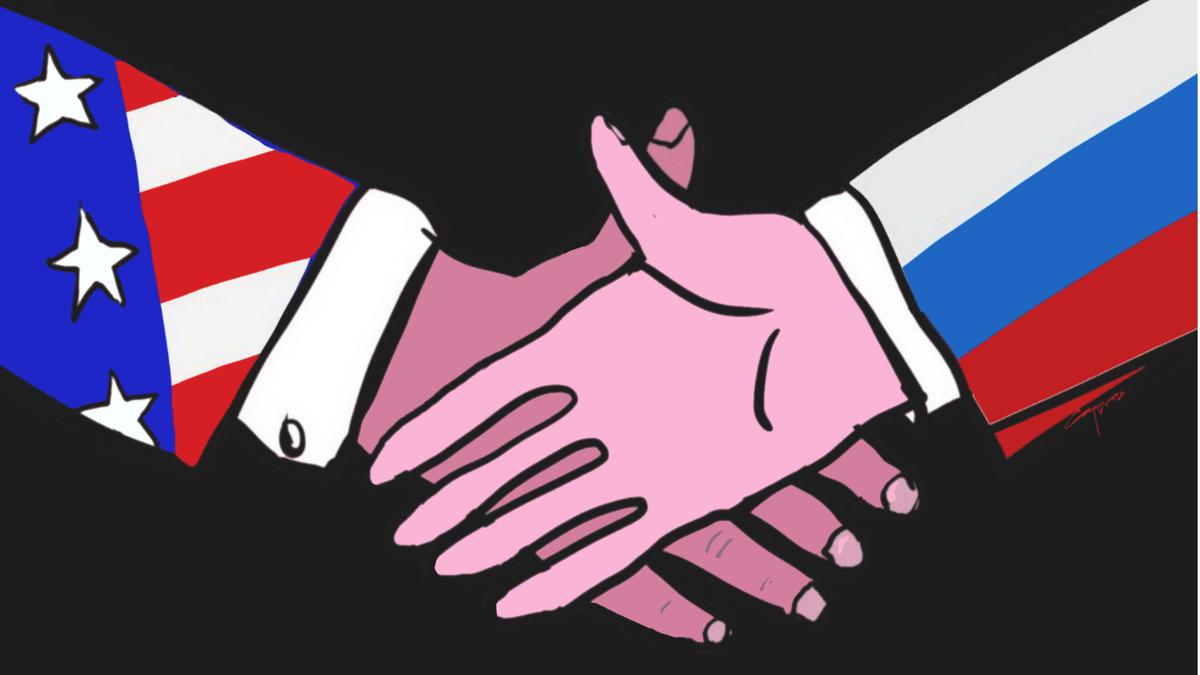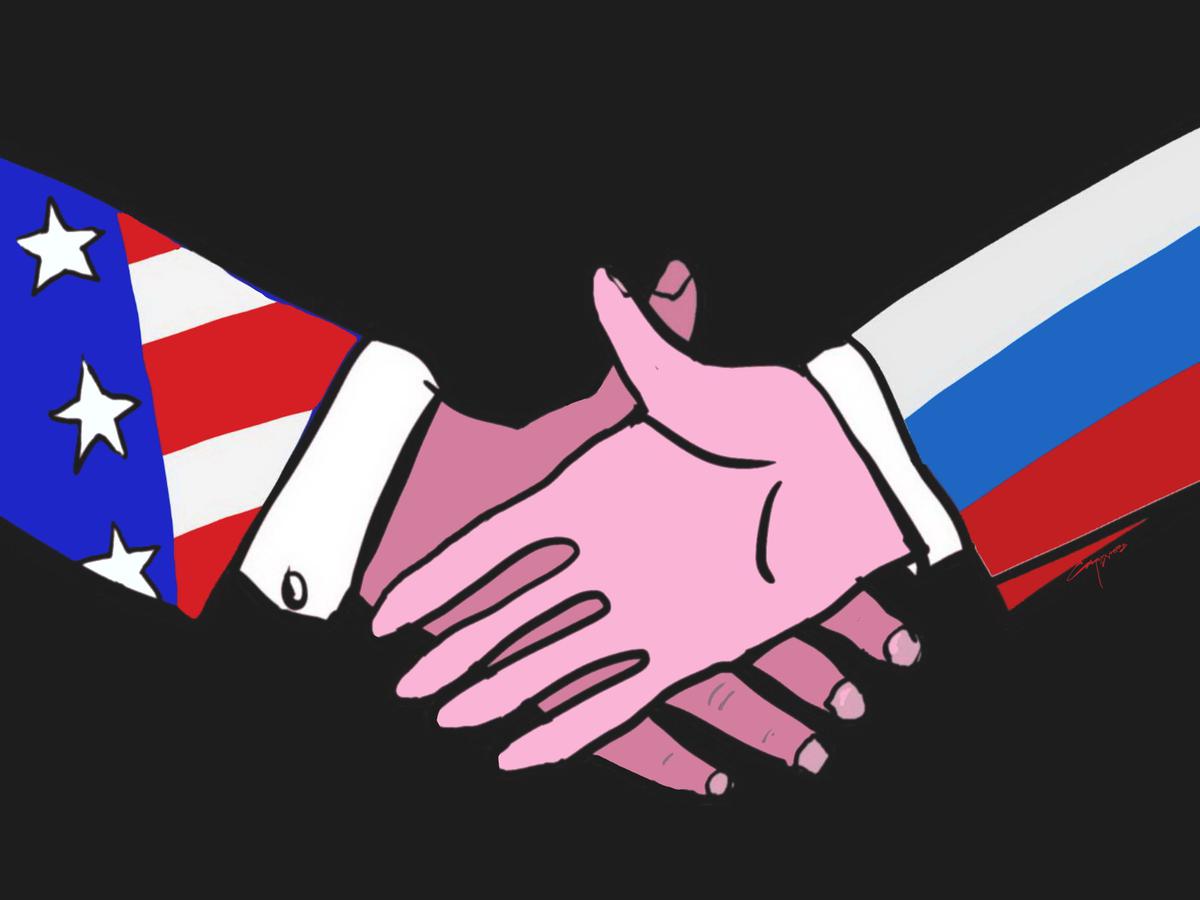
Illustration by Peter Sarukhanov / Novaya
Here what’s in store for you this week:
This week we explain why few in Russia are surprised at the collapse of the NATO-Russia talks. And why Russian independent observers are now being like ‘we told you so!’;
We cover mass bombing scare that trageted hundreds of Russian schools and exposed severe gaps in national security;
Plus, we also look into Putin’s broken promises to his own hometown.
Collapse of NATO-Russia Talks, Explained
On January 12, the Russia-NATO council met for the first time in more than two years against the backdrop of escalating tensions on the border between Russia and Ukraine. The meeting came on the heels of the bilateral U.S.-Russia meeting between Deputy Foreign Minister Sergei Ryabkov and Deputy Secretary of State Wendy Sherman. Ukraine — the country whose fate the parties discussed — was conspicuously absent from both forums. Things didn’t end well, as you might already know. This week our Brussels correspondent Alexander Mineyev reports on the collapse of the talks, while our deputy chief editor Andrei Lipsky analyzes what the talks say about Russian foreign policy.
WHAT MOSCOW SAID… The Russian delegation — led by Deputy Foreign Minister and former Permanent Representative of the Russian Federation to NATO Alexander Grushko — denied Western claims that Russia will invade Ukraine. They also reiterated their demand for NATO to take Ukraine’s potential membership off the table for good. Grushko also blamed NATO for the deterioration of the security situation in Europe, and lambasted the organization’s attempt to lower the ceiling on the use of nuclear weapons. Despite all this, he called the meeting a “heart-to-heart discussion.”
…AND WHAT NATO SAID. NATO ambassadors reiterated the threat that Russia would pay a “very high price” should it invade Ukraine. They also stressed the alliance’s ‘open door’ policy, dismissing any suggestion of barring Ukraine or any other country from the organization. NATO Secretary Jens Stoltenberg tried to strike a somewhat conciliatory tone, announcing his readiness to resume, without preconditions, the activities of the NATO offices in Moscow and Russia in Brussels, which were closed last year.
MOSCOW’S PROBLEM WITH NATO. The point to which the Kremlin returns time and time again when it comes to NATO is the alleged promise made by NATO Secretary General Javier Solana to Russian Foreign Minister Yevgeny Primakov in 1997 that NATO would not expand eastward towards Russia’s borders. Which it subsequently did when countries such as the Baltic states and Poland acceded to the organization. NATO stresses that no legally binding agreement was ever signed and that, regardless, any agreement from that time was reached on the assumption that Russia would remain a democratic — and therefore nonthreatening — state. This hasn’t stopped the Kremlin from repeatedly using this ‘broken promise’ as proof of Western duplicity, as well as to give credence to the propagandistic idea that Russia is encircled by enemies.
NO RESOLUTION IN SIGHT. Neither Russia nor NATO said anything unexpected. Both doubled down on the positions they have held for the past three decades, although both paid lip service to the need for greater dialogue and cooperation. “Too many risks and too little trust amid overblown ambitions” is Mineyev’s succinct summation of the talks. “We are waiting”, Mineyev concludes dryly, “for the continuation of the series.”
MODUS OPERANDI. According to our deputy chief editor Andrei Lipsky, the recent Russia-U.S. and Russia-NATO negotiations have merely been steps in the Kremlin’s usual cycle when it comes to dealing with the West:
“Scare — force negotiations — make extreme demands — refuse to continue negotiations — intimidate again — return to negotiations, perhaps with less extreme demands”. Attempting to put a positive spin on matters, he hopes that the current hardline rhetoric on both sides is about” maximizing starting positions — so that there is somewhere to retreat to in the course of «diplomatic trade». The shadow of war, however, remains present with Lipsky concluding that “The alternative to such an approach is so meaningless, fraught with dangerous escalation, and therefore suicidal, that one does not even want to consider it.”
BACKSTORY. The so-called «Donetsk People's Republic» and «Luhansk People's Republic» remain home to 3,000,000 Ukrainian residents. They remain trapped in the region amid heavy fighting sporadically breaking out in the area. The breakaway territories became self-proclaimed statelets after the 2014 pro-democratic revolution in Ukraine. The separatist movement was part of the Kremlin attempt to preserve political and economic control over the country. As then-president Ukrainian president Yanukovych fled to Russia, Moscow annexed the Ukrainian region of Crimea while stoking unrest in the country's eastern regions — effectively establishing control over 7 percent of the Ukrainian territory. At the time, Russian state propaganda manufactured a false narrative of an ethnic divide in Ukraine. It has been using it as an excuse to keep meddling in Ukrainian affairs since then. Moscow has never officially acknowledged the invasion of Eastern Ukraine. Still, the presence of Russian troops on the ground is well-documented, including by Novaya. The seven-year war has left approximately 13,500 dead, 1.6 million internally displaced, and over 800,000 refugees.
Read Mineyev’s full report here.
Putin’s Broken Promises to His Hometown
On New Year’s Eve, President Putin signed an order ending the long-standing dream of Petersburgers to create a city park near the downtown Neva embankment. On the same day, the Office of the Presidential Affairs (UDP) signed a contract to adjust the site development project: It is now to house the Supreme Court. Tatiana Likhanova explains what’s behind this 180 degree turn and how it highlights the growing assault on self-governing rights by the Kremlin.

The city park project near the downtown Neva embankment
WHY THE SUPREME COURT? Putin initiated the relocation of the Supreme Court from Moscow to St. Petersburg, the country’s second largest city and Putin’s hometown, in 2012. While there was an international competition to select the designer for the site, the project was granted not to the winner — Maxim Atayants — but to Yevgeny Gerasimov. The decision was never explained but — as is so often the case with big public projects in Russia — it is likely that the lack of transparency is deliberate. The original plan was for the site to include a theater, court buildings, and housing for judges. The idea changed when, in spring 2019, authorities announced that the court buildings would now be constructed near Smolny Cathedral, and the housing for judges in the Okhta business complex. The authorities claimed that this change was a response to the desire of the city’s residents for a park.
BROKEN PROMISE. During his election campaign in 2019, St. Petersburg Governor and Putin’s close ally Alexander Beglov ran on the promise of creating a park in this part of the city. The vision was grandiose, involving an amphitheater for outdoor performances, art galleries, concert and lectures. Beglov even presented the plan to Putin during the campaign, with the President remarking that it could be “better than Zaradye” — Moscow’s flashy new riverside park near the Kremlin. When BBC’s Russian service broke the news of the cancellation of the park project, Beglov’s office denied the claim. They insisted that the project remains “in development”, although they offered no details on the expenses, procurement processes, or timeline.
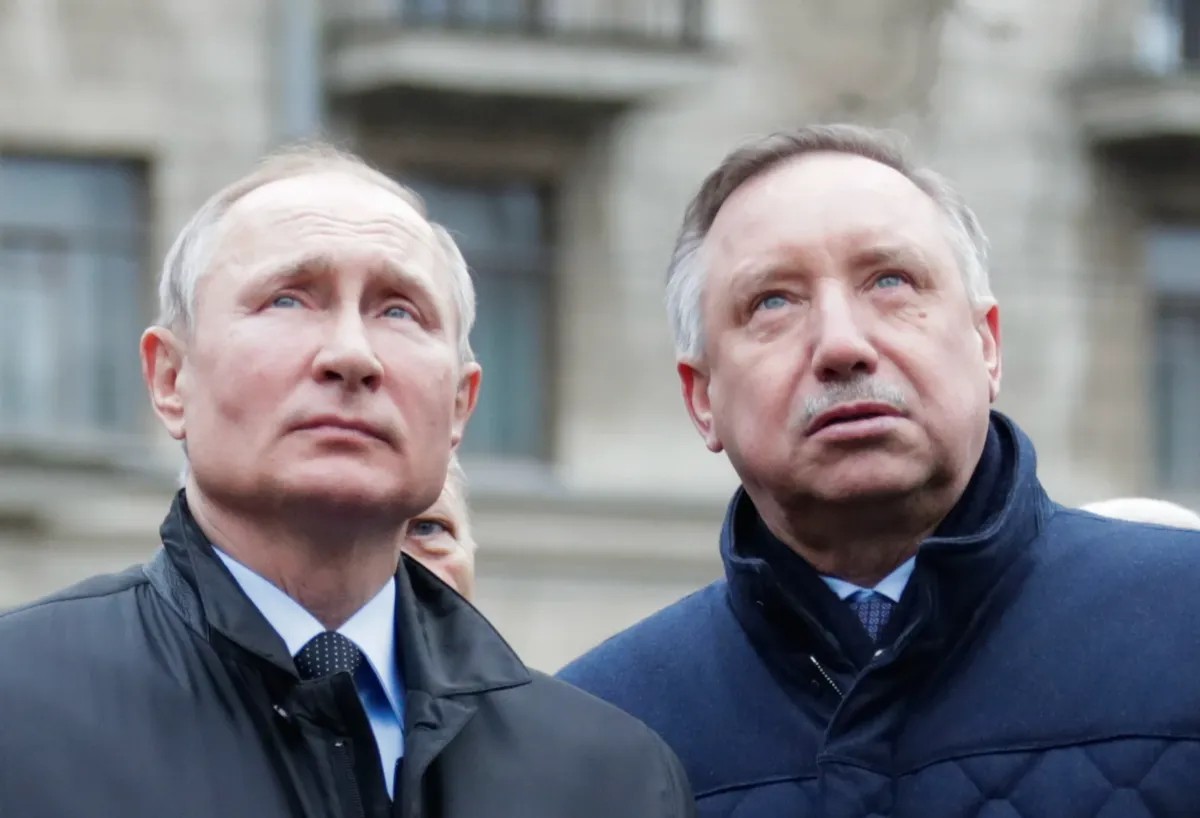
Mr. Putin and Mr. Beglov. Photo by RIA Novosti
NOT A SURPRISE. While the New Year’s Eve decision is no doubt a bitter pill for Petersburgers to swallow, the evidence suggests that the park concept was never anything more than an electoral gimmick for Beglov. Observers have highlighted the extent to which the Kremlin utilised its ‘administrative resources’ to ensure Beglov’s election. It is likely that they played along with — or even manufactured — the park idea for the same reason. Throughout the supposed about-face in 2019, the 2016 government resolution on the construction of the Supreme Court complex was neither cancelled nor amended. The government of St. Petersburg never issued any documents indicating a change in the fate of this territory. Novaya asked both the Presidential Office and the St. Petersburg authorities for concrete information on the construction of the park. We never received a response from either.
ST. PETERSBURG RESIDENTS FURIOUS. Likhanova remarks that the response of pitertsi to the shift back to the judicial complex plan has elicited a reaction that is “difficult to retell without the use of profanity”. The feeling is that this is yet another instance of politicians lying to the people for political gain. Her conclusion is grim:
Поддержите
нашу работу!
Нажимая кнопку «Стать соучастником»,
я принимаю условия и подтверждаю свое гражданство РФ
Если у вас есть вопросы, пишите [email protected] или звоните:
+7 (929) 612-03-68
“There could be a pleasant complex with a park”, she writes, “but instead we get a miserable monument to a terrible time.”
BACKSTORY. The Russian government's push for centralization dates back to 2004. At that time, Putin canceled direct elections for most provincial governors, while strong fiscal centralization made local self-governing elites directly economically dependent on the Kremlin. The authorities backpedaled slightly in 2011, resuming direct elections in the provinces through a party nomination process — which effectively put the candidate selection under the tight control of the ruling party. As a result, dissatisfaction with the lack of self-governing powers has been brewing in the regions for years. Many of Russia's regions are rich in oil, gas, coal, and other resources, which Moscow uses to fill its pockets. Authorities often strip regional communities from valuable resources or treat them as storage facilities for environmentally harmful materials while failing to divide the profits fairly. Revenue often primarily feeds Moscow's budget, with regions only receiving scraps while bearing the brunt of the damage.
Read Likhanova’s full analysis here.
School Bombing Scare, Explained
On January 12, local authorities evacuated all but 12 of Yekaterinburg’s 163 secondary schools in response to a bomb threat. Our Urals correspondent, Isolde Drobina, reports on the disturbing events in the country’s fourth largest city, while reviewer Aleksei Tarasov questions why these events are so common given the extensive power of the Russian security forces.
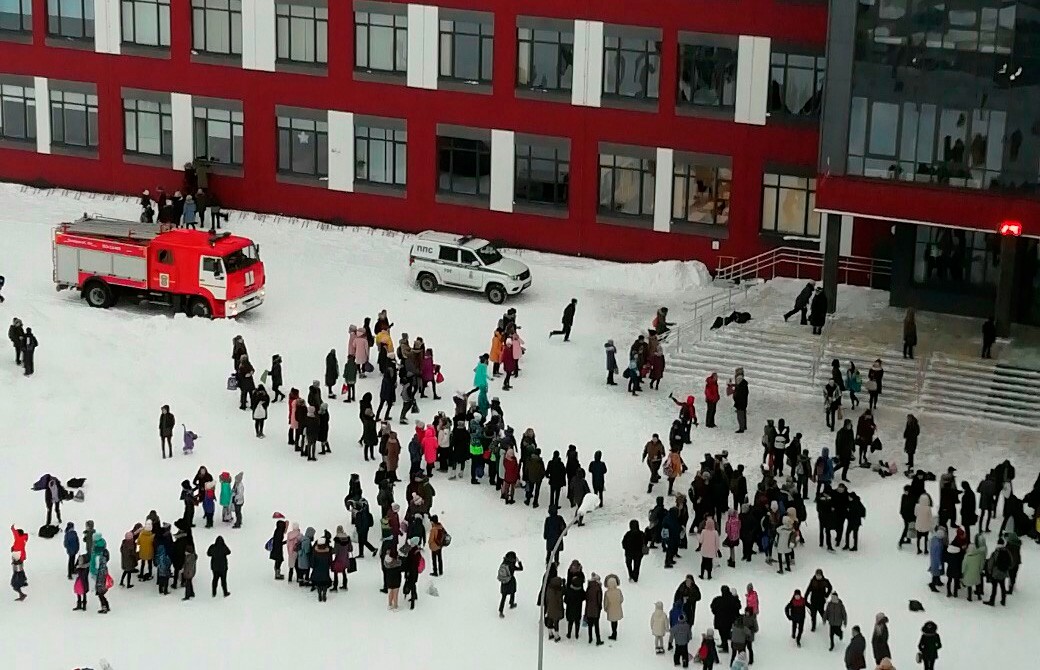
The evacuation in Novgorod. Photo: Social
WHAT HAPPENED? The evacuations began after a screenshot of a bomb threat — which had been sent to the schools — appeared in parental chats. The message, written in all capital letters, read “There is a bomb in the school. I have hated you all for my whole life. Today is your last. Feel my hatred. This is the end for all of you. I will blow up the school. You will all die.”
THE EVACUATIONS. The first evacuations began at half past seven in the morning, many children did not even have time to get to school. Some were turned around on the doorstep by the guards. Other schools were evacuated several hours later because the attacker’s message had gone to spam folders.
THE OFFICIAL RESPONSE. Aleksei Orlov, Yekaterinburg’s mayor, claimed that the potential attack bore a «trace from the outside», noting that “we have already gone through this more than once over the past 2-3 years. There are destructive forces from near abroad that are destabilising the situation." As Drobina notes, there is no evidence supporting this claim. Scapegoating unidentified foreign instigators is old-hat for Russian authorities, both at the local and federal level. It is safe to assume that here, as in most cases, the accusations are a transparent attempt from officials to deflect any responsibility from themselves.
NOT THE FIRST TIME (OR PLACE). This is not the first instance of a school bomb scare in Yekaterinburg, with a very similar incident happening two years ago — albeit on a smaller scale. The Ural State University of Architecture and Art, the Ural State University of Railways, the Mining University, the Yekaterinburg Theater Institute have also seen evacuations due to bomb scares. “Everyone has become accustomed to these waves of false mining”, writes Tarasov. Krasonyarsk experienced it in the last week of December. Before that, the same thing happened in Novosibirsk. Both incidents targeted schools. Similar evacuations after such scares have also taken place in Moscow, Saratov, and Orenburg.
MILLION DOLLAR QUESTION. Tarasov poses the real question that emerges out of these waves of bomb scares. “How do they [the would-be attackers] manage to do this without attracting the attention of the security forces? With their «Yarovaya package», with their powers, with their experience in monitoring IT systems and communications?” Back in January 2020, we at Novaya penned an open letter to the Director of the FSB calling on him to end the wave of “telephone terrorism”. The fact that these incidents continue to happen is a clear indictment of the inaction of Russia’s security forces.
BACKSTORY. The security of Russian schools gained international attention last year after the tragic school shooting in Kazan which left seven children and two adults dead. Although such tragedies are less common in Russia than in other countries, the shooting caused many to question the lack of security around schools. A related issue is the highly controversial “Yarovaya Package” , signed into law by President Putin on July 7, 2016. The package included a number of bills prepared by Deputy Irina Yarovaya and Senator Viktor Ozerov. The State Duma and the Federation Council adopted the bills on June 23 and 29 respectively. According to the bill, cellular operators are required to store all data transmitted by users for six months, and for three years information on the receiving, transmitting, delivering messages and calls. It obliges operators to provide government agencies with the means to decode encrypted communications.
Read Drobina’s full report here, and Tarasov’s analysis here.
Bonus Round
An open letter to Moscow governor Andrei Vorobyov by NGO founder and public figure Nyuta Federmesser has shed light on the region’s palliative care crisis. She highlights how palliative care is not funded by compulsory medical insurance, but rather through each region’s budget. “The quality of organizing assistance to people at the end of their lives (as well as any other assistance) depends on the political will of the head of the region”, she argues. The funds that the federal government dedicates to these regional ‘pots’, she writes, do not equate to real assistance for terminal patients. Hospitals, for example, often use the funds to provide extra beds for elderly people who need long term care rather than for those who are dying and are in severe pain.
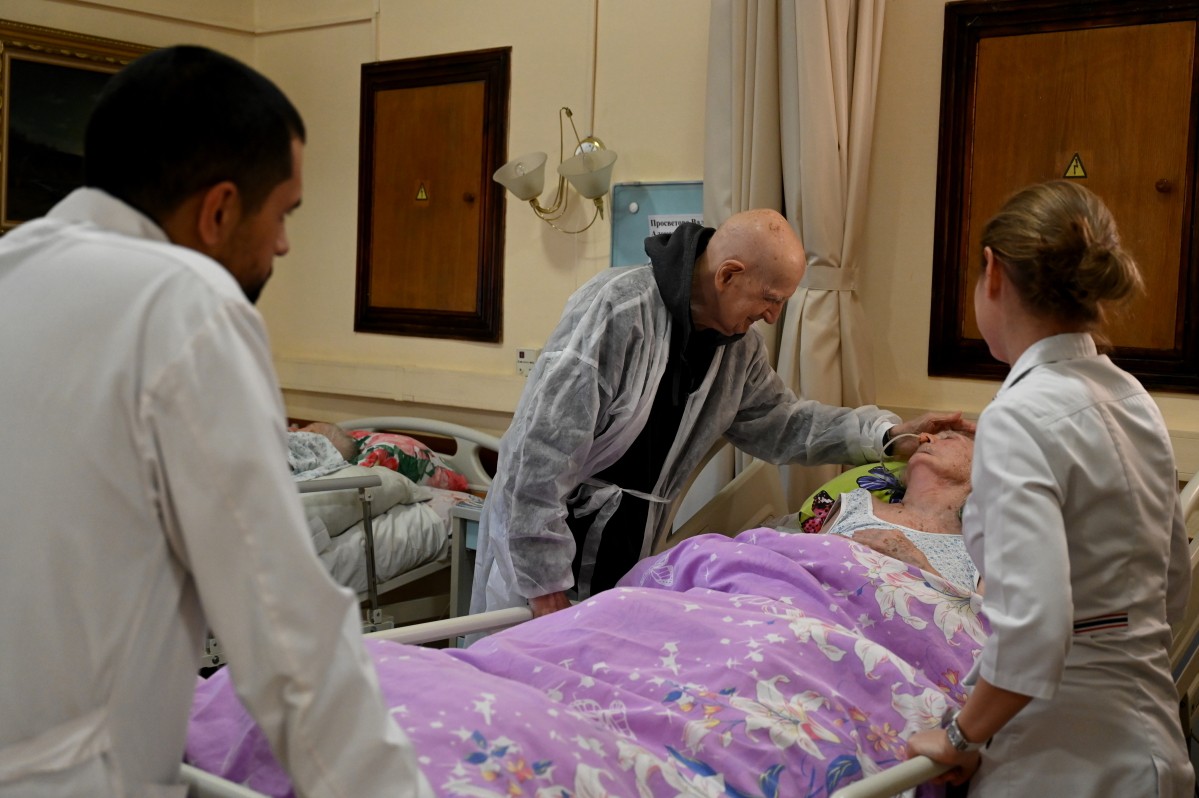
Photo by Yuri Kozyrev / Novaya Gazeta
“Palliative care departments”, she claims, are so in name only. She characterises the regional authorities’ response as follows: “The bed is occupied, budget funds have been spent, there are no complaints”. The failure to prescribe adequate painkillers to dying patients in sufficient time is another reason for their suffering. For Federmesser, this is unacceptable:
“For residents of the Moscow region, it takes not hours, but days to get anesthesia!”
Her damning conclusion is thus: That the Moscow regional authorities are engaging in a mass cover up to hide the suffering of the dying. “Lying is very handy when it comes to dying people”, writes Federmesser, “The dying will no longer complain, they simply will not have time — they will die. And their relatives will not complain either […] they do not have the strength to relive that humiliating hell to which your colleagues doom them.
This newsletter drop is written and edited by several journalists at the Novaya Gazeta newsroom. Please, support our work by promoting our newsletter with #RussiaExplained hashtag on social media.
To keep up with Novaya Gazeta’s reporting throughout the week, you can follow us on Facebook, Twitter, Instagram, and Telegram. Our video content is available on Youtube and don’t forget to visit our website for the latest stories in Russian.
The Novaya Gazeta Team
